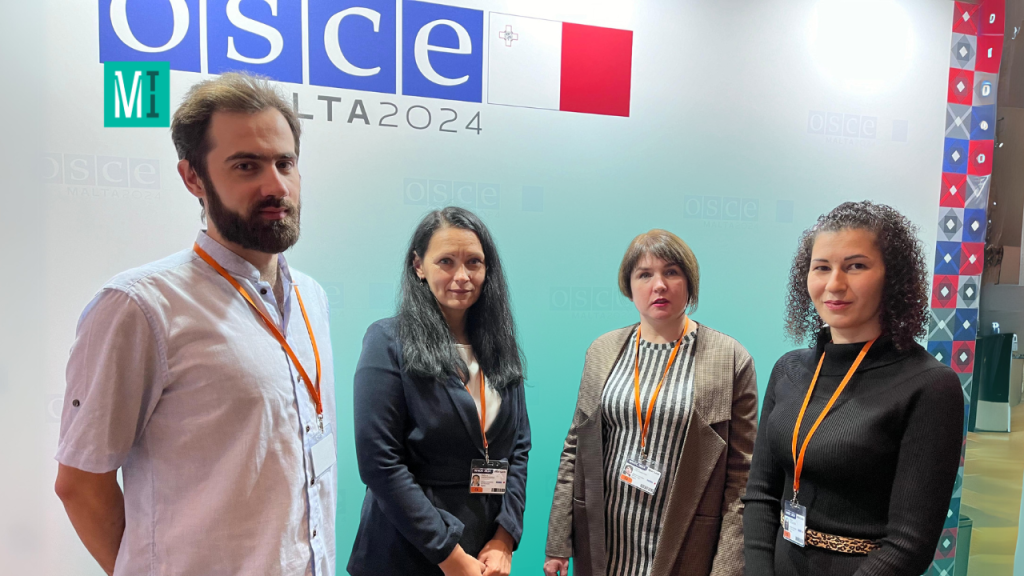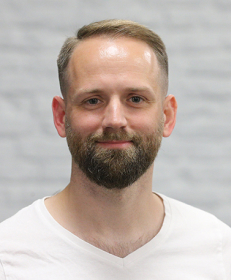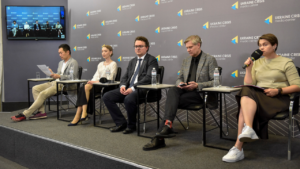Russia must be brought to accountability for crimes against humanity: a new investigation was presented in Warsaw

During the annual OSCE human rights conference in the Polish capital, MIHR presented a large-scale investigation into how Russia persecutes Ukrainians. This is its second part. It not only describes in detail the crimes committed by the Russian military in Kyiv, Chernihiv, and Sumy regions but also records the places where Ukrainians are held, the ways they are taken to Russia, and the names and military units involved in these crimes.
The investigation is based on in-depth interviews with 143 victims and witnesses. These interviews were entered into a special database, I-DOC, created to analyze and systematize investigations of war crimes and crimes against humanity. The facts documented by the MIHR team show that the main reason for the mass detentions of civilians in the occupied territories of Ukraine is suspicion of their disloyalty to the occupation and Russian troops. As a result, civilians were held in inhumane conditions, systematically tortured, and sometimes executed.
As of October 1, 2024, MIHR has documented and entered into the I-DOC system data on 399 victims detained in the northern regions of Ukraine during the period of their occupation. The investigation’s authors emphasize that the actual number of detainees is much higher.
Vadym Kubrak, who works as the head of the Kozarovychi operational section of the Irpin pumping station, was one of those abducted and tortured by the Russians in an attempt to force him to cooperate.
— I was fortunate to escape from captivity alive. But what about the rest of the Ukrainians held by Russia? They are not spared, — says Kubrak. — We were beaten, interrogated, and psychologically abused, and many other ways of torture were invented every day. Now, I am convinced the situation is even worse. The international community must put an end to these horrors.
— Today, some representatives of OSCE member states asked us questions, and I really hope that they will convey the information they heard to the highest level. Even though I, as a victim, want to distance myself from everything I have experienced, we still have to keep talking about Russia’s crimes and not forget about them. Without this, there would be no work to save Ukrainians, — Vadym says.

Vadym Kubrak, a former Russian civilian prisoner of war. Photo: MIHR
During the investigation presentation, Olha Shcherba from Bucha shared her story. For over two years, she has been looking for her three loved ones: her husband, brother, and friend. In the spring of 2022, they were abducted by Russians.
— The rights of Ukrainian civilians held by Russia are grossly violated, our people are tortured and abused all the time. My husband, my brother, and our friend are in Russian captivity. There is no communication with them, — says Olha.
According to her, the International Committee of the Red Cross has confirmed Russia’s detention of all three men for the first time in 2022 and for the second time in 2023. However, it is unknown where they are being held.
— For me, the biggest thing is that they should be released. Yes, there are no effective mechanisms to rescue them from captivity now, but we have to create these mechanisms. That’s why I’m here. That’s why I’m telling the entire international community about these crimes. And if right now there is no way to free my family and the rest of the civilian Ukrainians, we must at least improve the conditions of their detention. This is very important, — Olha emphasizes.

From left to right: Tetiana Katrychenko, Executive Director of MIHR, Olha Shcherba, wife of a civilian prisoner of the Russian Federation, Hanna Rassamakhina, one of the authors of the analysis. Photo: MIHR
To confirm the scale of the crime of persecution of civilians, the authors of the report cite evidence of Russia’s planned actions. Among them are the pre-prepared penitentiary institutions of the Russian Federation, where deported Ukrainians were taken. They are still being held there without being charged.
— What the Russians are doing to civilians is a crime against humanity. Because it is an indiscriminate, large-scale, systematic attack on the civilian population, united by the common policy of the Russian authorities. This crime is committed by a large number of people, and they all realize one common intent, — says lawyer Hanna Rassamakhina, one of the authors of the investigation.
It emphasizes that the intent to commit crimes against civilians is not the whim of any one person in Russia. Instead, the facts gathered by MIHR indicate a common intention of the military and political leadership of the Russian Federation: crimes are committed continuously and have specific goals of persecuting the civilian population.

The side event “How Russia persecutes Ukrainians. Reconstruction of Crimes in Three Regions of Ukraine” was held as part of the OSCE Warsaw Human Dimension Conference. Photo: MIHR
MIHR has also identified numerous units of the Russian Armed Forces and other state structures involved in the detention, deportation, and detention of civilians. These include the Federal Security Service, the military police, the Federal Penitentiary Service, the Investigative Committee of the Russian Federation, and others. According to the investigation, all of them interact at all stages of the crime, although they perform different functions. Significant material and human resources were used to organize the crime. Moreover, such coordinated actions of Russian state structures over a long period of time are impossible without direct orders from the highest military and political leadership of the Russian Federation. This indicates a unified state policy of the Russian Federation in committing systematic and large-scale crimes against the civilian population.
— Our main task is to systematize the collected information and present it as one big case demonstrating that the Russian Federation is committing a large-scale crime against humanity on the territory of Ukraine, — says Tetiana Katrychenko, Executive Director of MIHR.
— We have collected evidence from witnesses and victims, as well as documents and photographs. And we see that the Russian leadership is involved in this crime because it is impossible to prepare places of detention, coordinate transportation routes, and involve hundreds of pieces of equipment without the knowledge of the highest leadership of the Russian Federation, — emphasizes Katrychenko.
The side event “How Russia persecutes Ukrainians. Reconstruction of Crimes in Three Regions of Ukraine” was held as part of the OSCE Warsaw Human Dimension Conference. Photo: MIHR
According to Katrychenko, the next step in the investigation will be to prepare a submission to the International Criminal Court for the crime of persecuting civilian Ukrainians.
Read the analytical report here.







